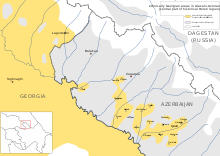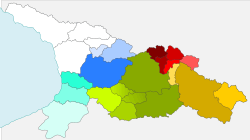Ingiloy people
Ingiloys[upper-alpha 1] (Azerbaijani: İngiloylar; Georgian: ინგილოები) are an ethnographic subgroup of Georgians who speak Ingiloy dialect of Georgian language.[3] Ingiloys are indigenous population of Saingilo (formerly known as Hereti), cultural and historical region in northwestern Azerbaijan.
| Total population | |
|---|---|
| 12,000 | |
| Regions with significant populations | |
| Languages | |
| Ingiloan dialect of Georgian | |
| Related ethnic groups | |
| Kakhetians and other groups of Kartvelians |
| Part of a series on |
| Georgians ქართველები |
|---|
| Nation |
| Georgia |
| Ancient Kartvelian people |
|
| Subgroups |
| Culture |
|
| Languages |
| Religion |
| Symbols |
|
| History of Georgia |
History
According to traditional accounts, the name of the Heretians (that is of Ingiloys) originates from the legendary patriarch "Heros", the son of Thargamos, who founded the city of Hereti (later known as Khoranta) at the Alazani River. With decline of Caucasian Albania, the area was gradually incorporated into the Iberian kingdom forming one of its duchies (saeristavo), throughout of 5th century its peoples were eventually assimilated into the Georgians proper.
During the Arab occupation the region was a separate kingdom within Georgian cultural and political influence. Hereti eventually became part of the Kingdom of Kakheti and Hereti. The latter was annexed to Georgian Kingdom in 1104. In the Middle Ages, seven Georgian schools operated in Hereti which included the courses of theology, philosophy, orthography, church history, and the history of Georgia and for the students. In the 15th century the term "Hereti" gradually disappeared from the political nomenclature and was replaced by the word "Kakheti".
In the early 17th century, Shah Abbas I of Safavid of Persia took these lands from the king of Kakheti and granted them to the Dagestani feudal clans. As a result of raids (Lekianoba) conducted by bands of Avar and Tsakhur warriors in Saingilo, the Ingiloys became serfs of the Dagestanian rulers, who forced them to pay tribute. In this way, gradually, by peaceful or hostile means, these tribes settled in Saingilo and colonized it. Already after the foundation of the sultanate of Elisu the conquerors had, by a concerted effort, undertaken the Islamization of the region.
After 1801, when the Kingdom of Kartli-Kakheti (eastern Georgia) became part of the Russian Empire the region ended up in the Imperial Russian conquest in 1803, Saingilo was initially incorporated into Zakatal Okrug of Tiflis Governorate. From 1918 to 1920 both Democratic Republic of Georgia (DRG) and Azerbaijan Democratic Republic (ADR) claimed its territory as theirs, but the dispute never led to an armed confrontation. After the fall of the ADR in 1920, Soviet Russia and Azerbaijan SSR recognized it as part of Georgia, whose government granted these lands a degree of internal autonomy. Following the Red army invasion of Georgia in 1921, the area was officially transferred to the jurisdiction and control of the Azerbaijan SSR by the central communist government in Moscow in 1922.[4]
Population
Demographics
| 1926[5] | 1939[6] | 1959[7] | 1970[8] | 1979[9] | 1989[10] | 1999[11] |
|---|---|---|---|---|---|---|
| 9500 | 10 196 | 9526 | 13 595 | 11 412 | 14 197 | 14 900 |


Census 2009
As of the census of 2009, the number of Georgians fell to a record low of 9,900 people. Most of them live in the Qax district (7,447 people) or in the city of Baku (2,226 people).[12]
Geographical distribution
The majority of the ingiloys today live in an area they call Saingilo, the name of the cultural region traditionally inhabited by the Ingiloys (Heretian) people in modern northwestern part of Azerbaijan. The Saingilo area — territory of 4,780 km2 — traditionally includes the Balakan, Zaqatala and Qakh districts.[13]
| Country | Concentration |
|---|---|
|
Muslim Ingiloys: |
Religion
By religion, Ingiloys are divided to Orthodox Christians and Sunni Muslims. As a result of missionary activities of the Orthodox Christianity Restoration Society, Ingiloys converted to Christianity in 1860, creating 12 laities, but in 1863, 9 of them converted back to Islam. In 1892, 62 converted to Christianity.[15][16]
There are only three active Georgian Orthodox Churches in Qakh district (Saint George's Church in Qakh Ingiloy village, Patara Alaverdi in Qax, Saint Nino's Church in Alibeyli village). Georgian Churches in Azerbaijan are under jurisdiction of Eparchy of Khornabuji and Hereti.[17]
Culture
In the village Alibeyli, there is Qakh State Georgian Drama Theatre. In 2009, documentary called "Ingiloys", dedicated to history, culture, traditions of this ethnic group was filmed in Azerbaijanfilm.[18]
There are seven Georgian schools in Saingilo, while four Azerbaijani schools have Georgian sectors.[19] Georgian language teachers are hired by education authorities of Zaqatala and Qax districts.[20]
Discrimination
Ingiloys are not allowed to give their newborn children Georgian names, they must choose a name from the list submitted by local authorities.[21] Christian Ingiloys are allowed to go to prayers only twice in year: on May 6 and November 23, during the celebration of Saint George.
Notable Ingiloys
- Mose Janashvili (1855–1934), Georgian historian, ethnographer, and linguist.
See also
Notes
- Brockhaus and Efron Encyclopedic Dictionary states that Ingiloys are an alternative name to Muslim Georgians.[1] It has been associated with the Old Turkish word yangili ("newly converted").[2]
References
- "Ингилойцы". Брокгауз-Ефрон., alternatively known as Heretians or Hers (Georgian: ჰერები)
- Ingilos World Culture Encyclopedia.
- Ronald, Wixman (1984). The peoples of the USSR: an ethnographic handbook. M.E. Sharpe. p. 82. ISBN 978-0-87332-506-6. Retrieved February 2, 2011.
- georgiatoday.ge Georgian Churches in Azerbaijan
- "Всесоюзная перепись населения 1926 года. Национальный состав населения по регионам республик СССР". «Демоскоп». Archived from the original on 2012-02-03.
- "Всесоюзная перепись населения 1939 года. Национальный состав населения по республикам СССР". «Демоскоп».
- "Всесоюзная перепись населения 1959 года. Национальный состав населения по республикам СССР". «Демоскоп».
- "Всесоюзная перепись населения 1970 года. Национальный состав населения по республикам СССР". «Демоскоп».
- "Всесоюзная перепись населения 1979 года. Национальный состав населения по республикам СССР". «Демоскоп».
- "Всесоюзная перепись населения 1989 года. Национальный состав населения по республикам СССР". «Демоскоп». Archived from the original on 2011-08-26.
- "Этнический состав Азербайджана (по переписи 1999 года)". «Демоскоп».
- pop-stat.mashke.org Ethnic composition: 2009 census in Azerbaijan
- georgiatoday.ge Georgian Churches in Azerbaijan
- Афранд ДАШДАМИРОВ (May 2, 2010). "Этнокультурная палитра Азербайджана". Газета Азербайджанский Конгресс.
- "Миссионерские общества". Брокгауз-Ефрон.
- Gnolidze-Swanson, Manana (2003), "Activity of the Russian Orthodox Church Among the Muslim Natives of the Caucasus in Imperial Russia". Caucasus and Central Asia Newsletter (UC-Berkeley), Issue 4 Archived 2013-06-20 at the Wayback Machine, pp. 9-20.
- patriarchate.ge ხორნაბუჯისა და ჰერეთის ეპარქია
- "В Азербайджане снят фильм про ингилойцев". vesti.az. October 9, 2009. Archived from the original on March 17, 2012. Retrieved February 10, 2011.
- Ministry of Education, Science, Culture And Sport of Georgia "Textbooks handed over to Georgian Schools in Azerbaijan" mes.gov.ge
- Council of Europe: Secretariat of the Framework Convention for the Protection of National Minorities, Fourth Report submitted by Azerbaijan pursuant to Article 25, paragraph 2 of the Framework Convention for the Protection of National Minorities (Received on 10 January 2017) , 10 January 2017, ACFC/SR/IV(2017)002
- Ministry of Education, Science, Culture And Sport of Georgia "Georgians in Azerbaijan Prohibited from Giving their Children Georgian Names" epress.am
Bibliography
- Akiner, Shirin (1986). Islamic Peoples of the Soviet Union: An Historical and Statistical Handbook. 2nd ed., 251–252. London: KPI.
- Bennigsen, Alexandre, and S. Enders Wimbush (1986). Muslims of the Soviet Empire: A Guide, 208–209. Bloomington: Indiana University Press.
- Changashvili, G. Z. (1970). Saingilo: Geographic-historical Study (in Georgian). Tbilisi.
- Dumbadze, M. (1953). Iz istorii Vostochnoi Kakhetii ( Saingilo ) (From the history of Eastern Kakheti [Saingilo]). Tbilisi.
- von Plotto, A. (1870). "Priroda i liudi Zakatal'skogo okruga" (Ecology and people of the Zakatal district). Sbornik Svedenii o Kavkazskikh Gortsakh (Tbilisi) 4.
External links
- Şirinbəy Hacıəli (2007), Şimal- Qərbi Azərbaycan: İngiloylar (I kitab: ən qədim zamanlardan XIII əsrin ortalarınadək) (in Azerbaijani)
| Wikimedia Commons has media related to Ingiloy people. |